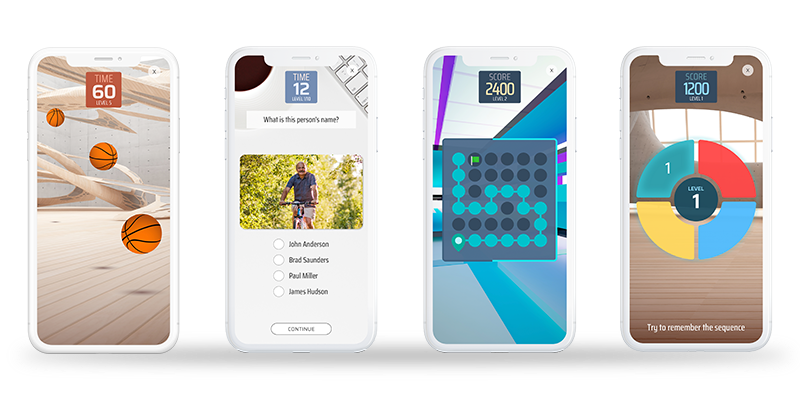By Christine Schulz on Mon, Jun 14, 2021
When we go to the doctor, we can forget up to 80% of what we're told by the time we get to the parking lot.
There are a few things that can cause this kind of short-term memory loss. For example, a shocking diagnosis can make someone unable to concentrate on what the doctor was saying, and therefore unable to absorb information (focus and memory are dependent on each other). Or, if you are given multi-step instructions, you may only remember a few of the items, perhaps in the wrong order—a natural result of new information overload. The root causes of a less-than-stellar memory are many. (Learn more about the four things most likely affecting your brain function.)
There are ways to improve memory and focus through brain training games and exercises, as well as reinforcing good habits. Before we jump into the best mental games and exercises to improve memory, it's important to understand how and why these memorization games work.
Can You Improve Your Memory?
Absent the effects of disease and aging, yes, there are natural ways to improve memory!
Of the four core brain systems, memory falls under the brain's cognitive function. Cognition is a conscious, rational process that supports decision making. Memory, along with functions like focus and planning, is a key capacity of the cognition part of your brain.
Improving memory involves increasing the new connections between neurons in the parts of the brain responsible for memory. How that happens depends on the type of memory you're looking to improve—short-term memory and long-term memory—and the context in which those memories are formed.
Your short-term, or "working memory," guides decision making and lasts for a mere 20 seconds or so. If your brain decides that a piece of information is important enough to hold on to for a while, it will convert the information into your long-term memory. This conversion happens in the hippocampus, and moves into the part of the brain that stores memories—the cortex. Long-term memories can remain for hours or years depending on how often you consolidate these new connections (by recalling them repeatedly, or connecting them to other memories).
You may have noticed something different about long-term memories when it comes to emotions. Some of our most vivid memories are tied up in emotion; conversely, these emotions can cause us to forget things entirely—childhood trauma and memory can go either way. That's because emotional or traumatic memories are converted into long-term memories by the amygdala, making them "stickier” than those formed in the hippocampus. It's why we remember negative things more intensely than emotionless, factual items. It's also why there's a connection between depression and working memory problems.
Memorizing something is only part of the battle. While the memory capacity of the human brain is huge, our ability to recall all that information in real-time is limited. How well can you recall all the data stored in your brain? That depends on your individual influencing factors, like genetics, your ability to focus, and how well you've trained your memory muscle. Total Brain offers four main games for improving memory, and several others for increasing your ability to focus.

Games That Improve Memory on the Total Brain App
Total Brain's memory-oriented games leverage proven techniques to improve memory:
Faces and Names
If you have trouble memorizing and recalling essential information about new people you meet, Faces and Names can help. The game "introduces" a series of new people in rounds, including their names and occupations, to better develop your ability to make associations for improved recall. Associating new information with an unrelated item is a useful hack for quickly memorizing something. In this example, someone's plane leaves at 2 p.m.; in order to remember the time, they picture the plane's two wings, saying, "My two-winged plane leaves at 2 p.m." This is your associative memory at work.
Memory Sequence
To improve short-term memorization and retention, try playing Memory Sequence. In this game to improve memory, players are faced with a circle divided into four colors (think of the old-school game Simon). Colors light up, corresponding with numbers and sounds. Players must mimic the order correctly to move up to the next level, starting with a series of four and becoming longer from there.
When it comes to remembering the order of things, it's easier to remember the first and last items in a sequence. Memory Sequence trains your brain to be better at memorizing the "middle content" by repeatedly asking it to retain the entire order to win. Strengthening this part of the memory can help with everyday tasks, like remembering grocery lists. And here's another trick for memorizing the order of things: use acronyms (the first letter of each fact or items into a vivid or memorable word, phrase, or story). Think of the memorization tricks we were all taught in grade school: "PEMDAS" ("Please Excuse My Dear Aunt Sally") to remember the order of solving an equation, or the imaginary character "ROY G. BIV" for the order of rainbow colors.
Memory Sequence also helps with the memorization trick of chunking, in which we organize the information we want to remember into groups of three. You can enhance chunking by using rhymes, which can more easily build links between pieces of information.
Memory Maze
We mentioned that memory is part of the cognitive function of the brain, which also involves making decisions—so it makes sense that you can improve your memory by training with Memory Maze, which helps players become experts at problem solving in the moment. In this game, players have to remember a path from one end to the other, laid out in a grid of dots. After seeing the path appear for a few seconds, players must repeat the same steps to get to the end. The better you get at remembering the paths, the more complex the routes get.
This taps into our brain's love of patterns. The brain is a pattern-generating system, and seeks them out. Once a pattern is identified, it becomes easier to remember multiple details under an umbrella of information.
Think Focus
We also mentioned earlier in the post that it's impossible to remember something we never really absorbed or processed—which happens a lot thanks to all the modern distractions in our daily lives. In a time where we can get messages instantly from anyone on multiple platforms, many of us have found help in training our brains to focus adequately and dismiss distractions. That's where Think Focus can help improve focus and attention for stronger information retention and memory formation. In this game, players have to balance a digital basketball that's spinning on the screen, elevated above the court. The goal is to keep your finger on the ball to keep it above ground. Throughout this timed game, the basketball makes very slight movements that require strong attention and quick reactions, which will move players up to the next level.
To really improve memory, games should be played several times a week. In a month, take the Total Brain assessment again to measure your improvement.
Non-Digital Tricks For Memorization: Tips to Improve Memory in the Long-term
Memorization practice through the games that Total Brain offers is one of several ways to remember things more efficiently. Some simple strategies that will give your brain training an additional boost include:
Writing things down and saying them aloud can help imprint information into your memory because it activates different parts of the brain. We see this at work in schools, where we're taking on lots of new information for memorization—we write it all down in our class notebooks and in homework assignments, and we discuss it with our peers.
Narratives can do wonders for remembering a set of data points. Creating stories can make it easier to remember dry facts because we turn them into something engaging (fun fact: this technique was invented by the Ancient Greeks). Narratives are great for remembering presentations or speeches you'd like to know by heart. To make this memorization technique even more effective, try weaving in novelty to your narratives; our brains are better at remembering novelty more than perfunctory information.
How did you remember the times table? Constant repetition. Memory is boosted by focused repetitions of key information. If you go this route, it's very important that you don't interrupt the consolidation pathway from short-term to long-term memory, which happens within an hour and a half of your focused repetition. Things like alcohol and drugs can erase what you've just learned.
Work on stress reduction. The effect of stress on memory is proven; via stress hormones like cortisol, stress reduces our capacity for memorization and learning. Engaging in breath training, short meditations, and positive visualizations will reduce stress and increase memory recall. You can access a varied selection of relaxing breathing exercises and meditations wherever you are in Total Brain's resource library. Sleep helps memory, as well—so make sure you're getting enough rest each night.
In the long-term, developing habits in alignment with the five steps for boosting brain function will add more oomph to your brain training. Keeping with it can be hard, so stay motivated by identifying results. Each day, ask yourself, "What was the best example of how my new memory habit was useful in my life today?" The more you train, the more often you'll have one (or more) answers to that question.
Ready to start your journey to a cracker jack memory? Take our 15-minute assessment to get an objective measurement of your memorization ability, and a personalized plan for how to improve your memory.




comments